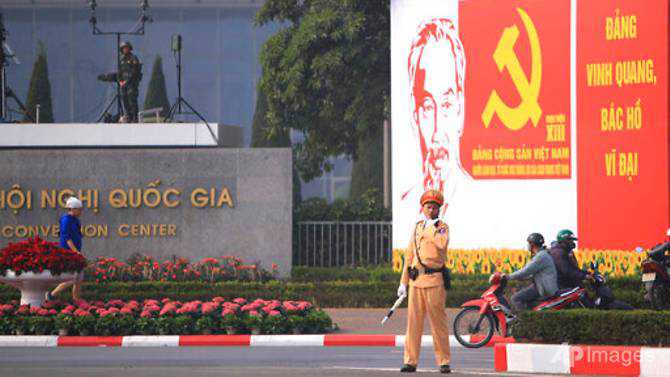Ruling Communist Get together to create Vietnam's course this week
25 January, 2021

Practically 1,600 leading members of Vietnam’s ruling Communist Get together meet this week to approve future policy and help choose the nation’s top leaders amid talk if the current party chief will remain.
General Secretary Nguyen Phu Trong, 76, defied standard wisdom by winning another term on 2016 against a favoured opponent. Trong has built his brand by presiding over monetary expansion and waging a favorite war on corruption.
There's been speculation selecting the new group of leaders is already a done deal, however the Vietnamese party is very secretive and citizens aren't even allowed to publicly discuss candidates.
The city’s streets are lined with the party’s hammer and sickle flags and posters to market the weeklong congress, which is held every five years. Around 4,900 people involved with the function must each have two lab tests for the coronavirus.
Vietnam is one of the couple of the world’s remaining communist single-party claims that tolerates zero dissent. However, policy isn't entirely dictated from the top.
A series of meetings straight down to the city level were held earlier in each of Vietnam’s 63 provinces and municipalities to choose the 1,587 delegates. They'll elect the 200-member Central Committee, which will select from 15 and 19 of its customers to serve on the Politburo, the highest party body.
The Politburo can make nominations for the “four pillars” - general secretary of the Communist Get together, the country’s most effective job; the president, a largely ceremonial content; the prime minister; and the National Assembly chairman. The nominations are then set to a vote in the get together congress.
Vietnam’s Communist Get together is known because of its collective leadership, which means crucial decisions are dependant on consensus found in the Politburo. The agenda for the congress is defined by the leadership picked at the previous meeting in 2016.
Factions associated with senior get together leaders means the contest for the top jobs may well not yet be settled.
“The largest issue the party faces at the congress is appointing a new generation of leaders. However, because of numerous factions within the get together, it has tested hard to obtain consensus on somebody who can replace get together chief Nguyen Phu Trong,” Murray Hiebert, a senior associate of the Southeast Asia System at the Center for Strategic and International Analyses in Washington, said within an email interview.
“The party’s regulations do not allow one to serve who's over 65 and/or has served two terms, but these rules will come to be waived in order that Trong can continue another term, despite the fact that he has been around ill health recently,” he said.
Relating to Tuong Vu, head of the political science department at the University of Oregon, the get together leadership this year appears more united than in 2016.
“The challenge this time around for the leadership is that the existing Standard Secretary Nguyen Phu Trong’s protege failed to garner more than enough support to displace him,” he said. If his favoured fellow Politburo member Tran Quoc Vuong cannot garner more than enough support, it opens the likelihood Trong would receive an exemption to serve a third term, he said.
“Granted his ill health insurance and advanced age, this as well generates uncertainties about upcoming succession,” Vu said.
Nguyen Khac Giang, a scholar of Vietnam affairs at New Zealand’s Victoria University, as well suggested Trong’s staying on might disrupt the succession procedure.
“Trong will be too powerful and that could hinder the collective leadership norm that the get together is definitely following,” he said. “He'd also set a precedent for others to cling to power and that could make it hard to groom leadership sustainably and injury the constitution over time.”
Trong advantages from his record on the economy, Hiebert explained.
Vietnam has grown typically 6 per cent in the last five years and almost 3 % in 2020, when the majority of its neighbours slumped into recession because of the pandemic, Hiebert said.
“It continued to attract foreign expense levels that will be the envy of almost all of its neighbors and got yet another boost as firms sought to go part of their supply chain out of China found in the wake of the U.S.-China trade war.”
On the debit area, Vietnam faced difficulty exploring for and exploiting offshore coal and oil because of China’s pressure on its activities in the disputed South China Sea, said Hiebert.
Human rights groups urged a give attention to those problems from the new leadership.
“The Vietnamese authorities’ intolerance of tranquil dissent has peaked beneath the outgoing leadership,” alleged Amnesty International. “The nomination of latest national leaders has an invaluable chance of Vietnam to improve course on human rights.”
Source:
TAG(s):
